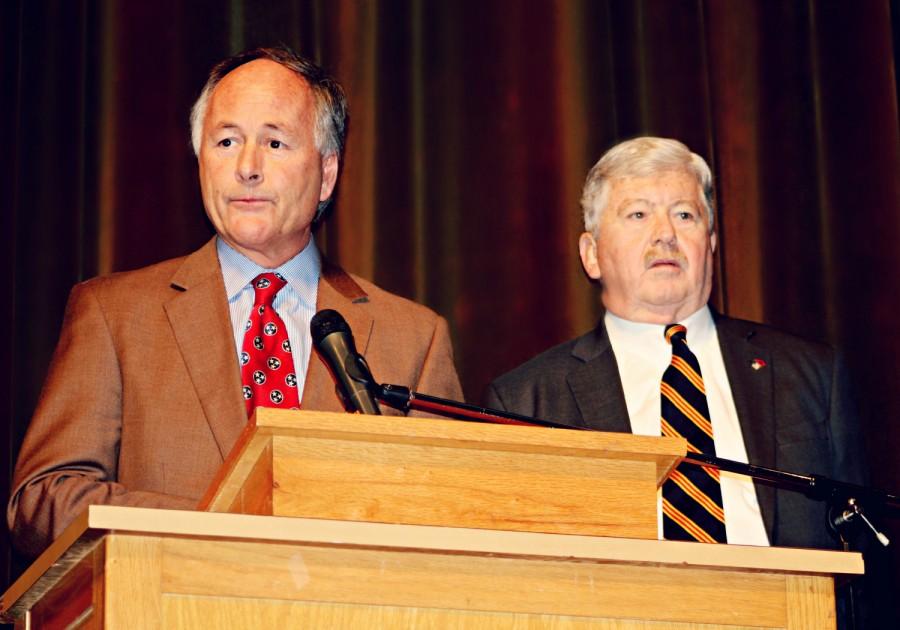Of State Politics (And the S-Word)
How to make angry millenials care.
More stories from Holly Thompson
Randy McNally and Jimmy Matlock visited the high school for a town hall meeting. (Find Matlock’s festive tie here: http://www.volunteertraditions.com/products/woven-tristar-ties)
State politics: more immediacy and relevance, less filibuster and blackening of the conscience. Although state senators and representatives don’t generally bring with them the glamorously Shakespearean connotations of, say, Kevin Spacey’s political dances in House of Cards, their jobs are imperative to the development of the state, and much more tailored to their constituents. Senator Randy McNally and Representative Jimmy Matlock, both representing districts that include Lenoir City, led the charge of a senior class town hall meeting. So what comes of it?
The questions, although written and rehearsed in classrooms, were challenging enough, touching on topics of gun control, gun crime, and sex education. (If anything, they at least afforded an opportunity for seniors to, for a moment, transcend their apathy and laugh at the word “sex.”) Both gave every appearance of being cut from the same red cloth, all Southern values and Southern lives of farms, small businesses, high school visits. Neither of them touched much on their experiences in office, although McNally, a member of Tennessee politics since 1977, was a crucial aid to an early 80’s investigation of political corruption in Tennessee, while Matlock has served on boards for a number of causes local to Loudon County during his two terms in the House.
Often when one talks about conservative politics, a few phrases come up – tea parties, shale oil, and traditional values. On a national scale in particular, I think a democrat is forced to be more dynamic, forced to keep up with the evolution of young adults. (See, for instance, Hillary Clinton’s dramatic shift from anti same-sex marriage to rainbow flag wielder in just a matter of years.) Conversely, republican social platforms tend to hold fast to a set of values held for many decades – value rooted in the family unit, marriage, the American dream, et cetera. In an interview following the meeting, Matlock lent credence to that theory:
“I don’t have any intention of changing my values. I don’t want to change what I believe, but I get chastised by my children every so often. They come up to me and say, ‘Dad, this is 2015. We’re not living in the Stone Ages.’ … But I don’t feel like I can change to the audience. If I believe it, I should say it and be honest about it.” (In good humor, he continued on to dub himself “an old fogey.”)
Although Americans often find themselves asking for more honesty, more transparency from politicians, where does it actually leave politicians like Matlock and McNally? And where do they stand with so-called millennials on the precipice of voting age?
When a student asked if Tennessee should change its policy of abstinence only sex education to something more comprehensive, Matlock answered with a “No” so resounding that it was met with applause. He was pressed no further until I interviewed him, and he clarified, “I believe you can peel back all the data and the only true teaching of abstinence has been proven to work. And people debate back and forth, ‘Should we extend into health issues, disease issues?’… That’s a great question. I just think abstinence trumps everything.”
That rationale, of course, didn’t belong so much as a post-town hall footnote delivered only to my ears and those of a blushing McNally. Therein lies an issue in communication between 18-year-olds and their politicians, or 18-year-olds and grown ups in general. The key to bridging the values of one generation to the next is in honesty forceful and confident enough that it allows for disagreement and allows for the audience not to feel glazed over or, at worst, some combination of boredom and amusement.
In fact, the moments that McNally and Matlock were most interesting – and most appealing – happened when they candidly discussed their own frustrations with the massive beast of government (or got in some solid jabs at Donald Trump.)
The trick to communicating to “young people,” as it were, doesn’t necessarily fall to making a Twitter account or snapping the events of senate’s meetings. Rather, it comes from the appeal of every-man types that take office with honest passion (even if, as they both agreed, making change can be harder than they initially thought). Of course, it doesn’t solidify support – that comes from policy – but a dynamic performance at least opens the ear. It’s not an age difference that matters so much at all – it’s communication.
